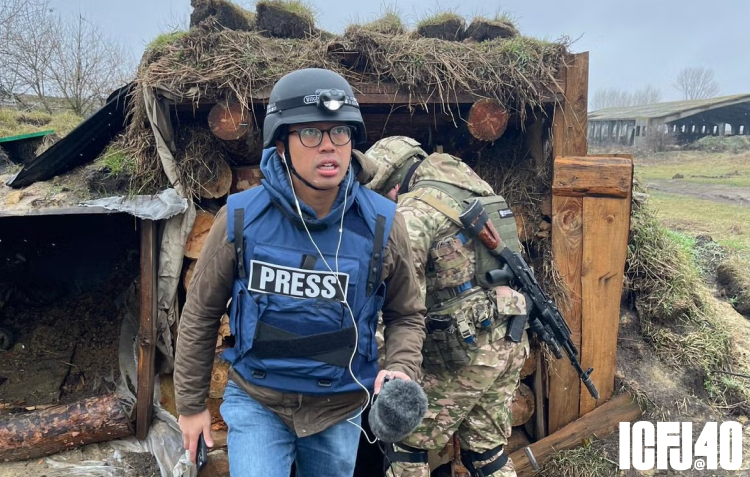When Tim Mak went to Djibouti in 2015 as an ICFJ fellow, it was the first time he had reported overseas. Today, less than a decade later, he is in Ukraine, bringing undercovered stories of the Russian invasion to English-speaking audiences.

The ICFJ fellowship was key for his pivot to foreign correspondent. “It opened the doors to a whole field of reporting that I never would have had access to otherwise,” said Mak, who took part in ICFJ’s Bringing Home the World program.
In 2023 Mak started The Counteroffensive out of Kyiv to provide deeply reported, human interest stories on the conflict. Another one of the publication’s goals is to empower young Ukrainian journalists by teaching them how to produce compelling feature writing for Western audiences in English.
Originally from Canada, Mak previously covered the war for NPR, and has also reported for The Daily Beast, The Washington Examiner and Politico.
What was the biggest outcome from your fellowship with ICFJ?
The fellowship was my first overseas assignment – the sort of resource-intensive project my employer would not have funded themselves. But getting to report from abroad inspired me to think more broadly about the kind of journalism that I want to do – and how I could do more stories like this in the future. It opened the doors to a whole field of reporting that I never would have had access to otherwise.
What motivated you to start The Counteroffensive?
Human interest journalism – the kind of reporting that inspires empathy from thousands of miles away – is a challenging style of journalism, and one that is not a priority for many resource-constrained newsrooms. I wanted to focus primarily on that, and see if we could create a sustainable model for this type of journalism.
Was your experience with ICFJ helpful to you in starting the publication?
Absolutely. It helped me get gear which I still use to this day (a trusty battery pack which has somehow survived over the years). But most importantly, it helped me build confidence and experience in foreign correspondence – something that I would not have had the opportunity to do otherwise.
What is a recent story you’ve worked on that you hope more people will read?
This is a good example of our style of journalism – picking an undercovered topic in the war, chronic sleeplessness and fatigue due to missile alerts – and diving into the human costs: Sleep deprivation in Kyiv: long term effects of 3 a.m. Russian attacks.
What kind of difficulties do you face in your work?
How much time do you have? Everything from business and financial constraints, to safety considerations in a warzone, to the everyday difficulties of putting together two issues each week!
Are you looking for other journalists to collaborate with on any projects? If so, tell us about it.
We’re looking to expand our team in Ukraine, so are looking for English-speaking journalists in Kyiv to hire. Let us know if you have any suggestions!
Why is it so important right now to provide the kind of support to journalists that ICFJ does?
In an environment where news organizations are constrained financially, ICFJ creates opportunities that would otherwise not exist inside newsrooms. Foreign reporting is among the most expensive kinds of journalism – so without an ICFJ fellowship, I wouldn’t have been able to get my start.